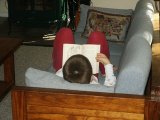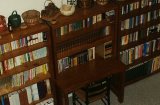 Jo and I love reading books together. We have read between two to three books in the past couple months. The last one we read was Sylvie and Bruno by Lewis Carroll (the author of Alice in Wonderland). As it is a little known book (indeed I had never heard of it before), I thought I would review it so others may benefit from our reading.
Jo and I love reading books together. We have read between two to three books in the past couple months. The last one we read was Sylvie and Bruno by Lewis Carroll (the author of Alice in Wonderland). As it is a little known book (indeed I had never heard of it before), I thought I would review it so others may benefit from our reading.Sylvie and Bruno is a story that amuses children but requires one to be grownup to fully enjoy it, similar to the books Alice in Wonderland and Winnie the Pooh.
It is written in first person and switches from the author's trip to the country to the author following the adventures of two fairies. Sometimes it can grow confusing until you realize the author keeps falling asleep and dreaming. At the times when he is dreaming about the fairies, conversation is light and nonsensical. When he is awake, the conversation still has elements of nonsense, but acquires a more serious tone. A rudimentary knowledge of mathematics and logic is helpful to understanding the conversation at times as in this quote:
"'For a complete logical argument,' Arthur began with admirable
solemnity, 'we need two prim Misses--'
'Of course!' she interrupted. 'I remember that word now.
And they produce--?'
'A Delusion,' said Arthur.
'Ye--es?' she said dubiously. 'I don't seem to remember that so well.
But what is the whole argument called?'
'A Sillygism?'
'Ah, yes! I remember now. But I don't need a Sillygism, you know,
to prove that mathematical axiom you mentioned.'
'Nor to prove that 'all angles are equal', I suppose?'
'Why, of course not! One takes such a simple truth as that for granted!'"
 I cannot give a neat little summary of the book because it has two pieces and neither quite ends in a definite manner. Here is the best I can do:
I cannot give a neat little summary of the book because it has two pieces and neither quite ends in a definite manner. Here is the best I can do:Section one is that which contains the fairies' adventures. The two little fairies, Sylvie and Bruno, live in "Outland" of which their father is Warden. There is a plot by the Warden's brother to take over Outland and become emperor. The Warden knows it, but does not let on that he does. Then the Warden leaves and we find out later that he has become king of another land. Sylvie and Bruno join him later. That is really all of a plot for section one. Sylvie and Bruno have a couple of other adventures, but these are not as important.
Section two is that in which the author is awake. Here the author is an old man with heart problems. A young friend of his, a doctor, asks the author to stay with him in a house in the country. On the way there, the author meets a young lady. It turns out the doctor is in love with the lady. He (the doctor) has just inherited some money so he can finally ask the lady to marry him. Before he does so, he wishes to ascertain her feeling towards him. The author tries to do so for the doctor, but never gets very far. In the end, the lady marries her distant cousin who shows up, the doctor goes to South Africa, and the author leaves for business in the city.
I think the chief thing of interest in this book is the conversations. Some are thoughtful, some are witty, some are silly, some touch views of theology (not all of which I agree with), but they almost all have a piece of truth.
I think there was one section which most stood out to me most of all. It has influenced the way I read books ever since. It is as follows:
"'By no means!' replied the Earl.
'What I mean is intensity of thought--a concentrated attention.
We lose half the pleasure we might have in Life, by not really attending.
Take any instance you like: it doesn't matter how trivial the pleasure
may be--the principle is the same. Suppose A and B are reading the same
second-rate circulating-library novel. A never troubles himself to
master the relationships of the characters, on which perhaps all the
interest of the story depends: he 'skips' over all the descriptions of
scenery, and every passage that looks rather dull: he doesn't half attend
to the passages he does read: he goes on reading merely from want of
resolution to find another occupation--for hours after he ought to have
put the book aside: and reaches the 'FINIS' in a state of utter
weariness and depression! B puts his whole soul into the thing--on the
principle that 'whatever is worth doing is worth doing well':
he masters the genealogies: he calls up pictures before his 'mind's eye'
as he reads about the scenery: best of all, he resolutely shuts the
book at the end of some chapter, while his interest is yet at its
keenest, and turns to other subjects; so that, when next he allows
himself an hour at it, it is like a hungry man sitting down to dinner:
and, when the book is finished, he returns to the work of his daily
life like 'a giant refreshed'!'
'But suppose the book were really rubbish--nothing to repay attention?'
'Well, suppose it," said the Earl. "My theory meets that case,
I assure you! A never finds out that it is rubbish, but maunders on to
the end, trying to believe he's enjoying himself. B quietly shuts the
book, when he's read a dozen pages, walks off to the Library, and
changes it for a better!'"

I recommend this book for people who are needing a laugh. The Professor's plunge bath, phlizzes, the Other Professor, and the abundance of rhymes and songs are all memorable. And perhaps when you are done, you will wish for a clock that will reverse the whole sequence of events for an hour.


4 comments:
But isn't every right angle equal? It's only those left angles that confuse people like myself who can't keep right and left straight.
Kirsten,
I must agree that the conversation about "attending" is very good. The book itself seems to be the sort that you would probably either really like or despise....
Thank you for enlightening us!
Love, M
PS - Who IS your editor? :o)
Every right angle is equal but obtuse and acute angles are not equal to right angles.
Here is Annie's smiley face:
8*D :)
There's an article about sylvie and bruno here
Post a Comment